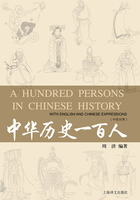
Qin Dynasty (221-206 BC)
Initiated a Centralized Power System in China
23 Qin Shi Huang
The First King in China, Also a Notorious Tyrant

Qin State in the Warring States Period, after conquering six powerful rivals, founded a great unified empire in China, and the emperor of the State entitled himself as Qin Shi Huang (259-210 BC). Literally, shi meant first, huang meant king, for he hoped his son would be entitled the second King, his grandson the third King …, Qin Dynasty could be passed down on hundreds of thousands of generations. Qin State’s victory symbolized the victory of the Law School Thought. (The Law School in ancient China had nothing to do with the modern concept of Rule by Law, but suppressed more rigidly to the people.)
For realizing the aim of permanent ruling, Qin Shi Huang had built the Great Wall to thwart northern ethnic troops’ invasion on one hand, and suppressed people more cruelly on the other. He at first launched a campaign of “burn out books and bury intellectuals”. He buried more than 360 Ru (Confucius) scholars alive, and ordered to burn out all kinds of books except medicine and divine ones. He executed those who dared to keep privately any books. Qin Shi Huang had basically destroyed Chinese ancient civilization created during hundreds of years of Hundred Schools Thought Contend. At the meantime, for the sake of preventing people from possessing weapons, Qin Shi Huang confiscated all household iron and bronze wares to cast 12 big metal statues standing on the crossroads of the capital city Xianyang (west of Xi’an).
When the building of the Great Wall was under way, other two tremendous construction projects were also started-up: One was A-fang Palace, a most grand and sumptuous royal palace, the other was his mausoleum. Qin Shi Huang began to build his mausoleum in his 30s, and he forced 700,000 prisoners of war (POW) to do the death labor. Qin treated people like animals, so just one year after Qin Shi Huang died, people began to rise up with only holding bamboo rods as their weapons. Qin’s Second King eventually witnessed the collapse of his regime.
But, Qin Shi Huang had initiated a political system of power centralization. Instead of granted lands to his family members and meritorious officials, he divided territory to be counties and prefectures, and directly appointed and dismissed officials that made China for the first time a real unified country. So Qin Shi Huang was given a title as “the first king in history” by historians.
After 2,200 years (in 1970s), three peasants in Shaanxi Province occasionally found several bits of pottery that led the discovery of the Qin’s terra-cotta warriors. People believed it was merely a corner of iceberg of Qin Shi Huang’s mausoleum.